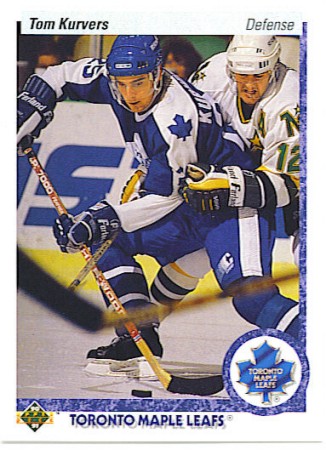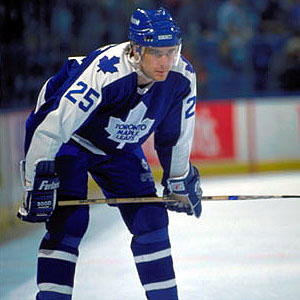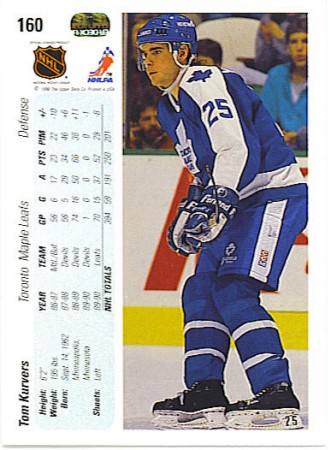After 19 games in 1990-91, the Leafs were 2-16-1 and had lost six straight. If we granted points this year the way they used to be granted, the Leafs would be 3-15-1 and they've lost four straight, so it's probably time to revisit my earlier thoughts about how this year is so much less depressing than that one.
By this time, Doug Carpenter had been fired, John McIntyre had been shipped out for Mike Krushelnyski, and Olczyk and Osborne had gone to Winnipeg for Ellett and Fenton. On Nov. 14, Tom Kurvers, whose year had been brutal, blew out a knee. To make up for his loss, the trade that sent first-rounder Scott Pearson and a pair of seconds to Quebec for Broten, DeBlois and Petit took place three days later (19 years ago yesterday). (Note - because of scheduling differences, those Leafs were ahead in terms of games played. Kurvers was hurt in game 21.)
Comparatively, this year's Leafs have been remarkably static. There have been no player moves of note other than the odd Marlie shuffle. Ron Wilson is still coach. (Are the pending Olympics playing a part in this?) Brian Burke still hasn't shown the kind of panic that seemed to envelope that earlier team. He seems to be less afraid to be "the guy who traded Taylor Hall" than Floyd Smith seemed to be about being "the guy who traded Eric Lindros." A calm hand might yet figure out how to fix this thing, or at least minimize the damage without destroying the future.
Other reasons to prefer today's situation include the fact that there are actually a couple of kids we like on the horizon. In 1990-91, everyone who was coming was already there. Today's Leafs also have a goaltender who could be the real deal, even if they inexplicably choose not to play him.
The other difference is that Kessel and Kurvers are very, very different entities.
It's not that Kurvers was either a bad player or a bad guy. It's just that Kessel is a front-line talent who so far is also playing like it. Kurvers was a pretty good second option who couldn't carry the freight all by himself.
When that trade went down in the fall of 1989, Kurvers originally refused to report to the Leafs. I don't recall what the rationale was, but one can only imagine what might have been if he'd stuck to his guns and somehow that trade was reversed. As it was, his holdout only lasted a day or so and he suited up right after that.
Kurvers play that season was basically what you'd have hoped for. He hit for 15 goals and 52 points in only 70 games and after Iafrate he was more or less tied with Ramage as the Leafs' best offensive defenseman.
When Smith mocked the doubters in 1989 by saying the Leafs wouldn't be finishing last in 1990-91, there was some pretty solid evidence to back him up. The entire 1989-90 season showed it.
I still think the loss of Iafrate's skating was the single most damaging factor to the 1990-91 team. It put all the onus on Kurvers and Ramage and without Iafrate, those two struggled. Add in the fact that the goaltending was iffy and the forwards looked a lot like, well, this year's forwards and the disaster unfolded like it did.
The 1990-91 Leafs probably would have been better off to have accepted their fate and gutted it out. They might have finished dead last, but they'd have kept that young core in place. Assuming Fletcher still arrived the following summer, he'd have had a lot more to work with.
Kurvers himself was sent to Vancouver in January, 1991. Now freed from being "the guy traded for Lindros," his game returned. After having just three points in 19 games with Toronto, he scored 27 in 32 games for the Canucks. He was then productive in New York for three more years. Brian Bradley, who the Leafs got in exchange, didn't score a goal all year and then had just 10 the following season. He'd be lost to Tampa in the expansion draft, for whom he immediately became a 40-goal scorer.
I have no idea what Burke will do to fix this one. I'm not convinced that he can - not this year, anyway. I just hope he doesn't shred all hope the way Smith did. Better to have sacrificed Taylor Hall and have your core intact than sacrifice the sleeper pick and have nothing.
---
Tom's stats:
| 1980-81 | U. of Minnesota-Duluth | WCHA | 39 | 6 | 24 | 30 | 48 | ||||||
| 1981-82 | U. of Minnesota-Duluth | WCHA | 37 | 11 | 31 | 42 | 18 | ||||||
| 1981-82 | United States | WJC-A | 7 | 3 | 3 | 6 | 16 | ||||||
| 1982-83 | U. of Minnesota-Duluth | WCHA | 26 | 4 | 23 | 27 | 24 | ||||||
| 1983-84 | U. of Minnesota-Duluth | WCHA | 43 | 18 | 58 | 76 | 46 | ||||||
| 1984-85 | Montreal Canadiens | NHL | 75 | 10 | 35 | 45 | 30 | -3 | 12 | 0 | 6 | 6 | 6 |
| 1985-86 | Montreal Canadiens | NHL | 62 | 7 | 23 | 30 | 36 | +9 | |||||
| 1986-87 | Montreal Canadiens | NHL | 1 | 0 | 0 | 0 | 0 | +1 | |||||
| 1986-87 | Buffalo Sabres | NHL | 55 | 6 | 17 | 23 | 22 | -10 | |||||
| 1986-87 | United States | WEC-A | 10 | 3 | 1 | 4 | 11 | ||||||
| 1987-88 | New Jersey Devils | NHL | 56 | 5 | 29 | 34 | 46 | +6 | 19 | 6 | 9 | 15 | 38 |
| 1988-89 | New Jersey Devils | NHL | 74 | 16 | 50 | 66 | 38 | +11 | |||||
| 1988-89 | United States | WEC-A | 10 | 2 | 2 | 4 | 8 | ||||||
| 1989-90 | New Jersey Devils | NHL | 1 | 0 | 0 | 0 | 0 | -1 | |||||
| 1989-90 | Toronto Maple Leafs | NHL | 70 | 15 | 37 | 52 | 29 | -8 | 5 | 0 | 3 | 3 | 4 |
| 1990-91 | Toronto Maple Leafs | NHL | 19 | 0 | 3 | 3 | 8 | -12 | |||||
| 1990-91 | Vancouver Canucks | NHL | 32 | 4 | 23 | 27 | 20 | -13 | 6 | 2 | 2 | 4 | 12 |
| 1991-92 | New York Islanders | NHL | 74 | 9 | 47 | 56 | 30 | -18 | |||||
| 1992-93 | New York Islanders | NHL | 52 | 8 | 30 | 38 | 38 | +9 | 12 | 0 | 2 | 2 | 6 |
| 1992-93 | Capital District Islanders | AHL | 7 | 3 | 4 | 7 | 8 | ||||||
| 1993-94 | New York Islanders | NHL | 66 | 9 | 31 | 40 | 47 | +7 | 3 | 0 | 0 | 0 | 2 |
| 1994-95 | Mighty Ducks of Anaheim | NHL | 22 | 4 | 3 | 7 | 6 | -13 | |||||
| 1995-96 | Seibu-Tetsudo Tokyo | Japan | 20 | 18 | 34 | 52 | |||||||
| Leaf Totals | 89 | 15 | 40 | 55 | 37 | -20 | 5 | 0 | 3 | 3 | 4 | ||
| NHL Totals | 659 | 93 | 328 | 421 | 350 | -35 | 57 | 8 | 22 | 30 | 68 |
WCHA First All-Star Team (1984)
WCHA - Most Valuable Player (1984)
NCAA West First All-American Team (1984)
Hobey Baker Memorial Award (Top U.S. Collegiate Player) (1984)
- Traded to Buffalo by Montreal for Buffalo's 2nd round choice (Martin St. Amour) in 1988 Entry Draft, November 18, 1986.
- Traded to New Jersey by Buffalo for Detroit's 3rd round choice (previously acquired, Buffalo selected Andrew MacVicar) in 1987 Entry Draft, June 13, 1987.
- Traded to Vancouver by Toronto for Brian Bradley, January 12, 1991.
- Traded to Minnesota by Vancouver for Dave Babych, June 22, 1991.
- Traded to NY Islanders by Minnesota for Craig Ludwig, June 22, 1991.
- Traded to Anaheim by NY Islanders for Troy Loney, June 29, 1994.
The HHOF take on Tom:
Early in the 1989-90 season, Kurvers was shipped to Toronto for a first-round pick that became Scott Niedermayer. The Maple Leafs had too many offensive players who could not cope with the tight checking of the post-season. Kurvers was dispatched to Vancouver in 1990-91 and later played with the New York Islanders and Mighty Ducks of Anaheim. Before retiring he played the 1995-96 season in Japan with the Seibu Tetsudo club of Tokyo. Kurvers was never a defensive stalwart but he played to his strengths and, when paired with the right person, could be very effective. He finished with 421 points in 659 career games."
"Tom Kurvers was a pure offensive defenceman with outstanding passing skills and a quick release from the point. In his eleven years in the NHL he was a considered a positive influence on the ice and in the dressing room.
Born in Minneapolis, Minnesota, he scored 175 points in four seasons at the University of Minnesota-Duluth between 1980 and 1984. His talent was noticed by the Montreal Canadiens who drafted him 145th overall in the 1981 NHL Entry Draft.
In 1982 Kurvers represented the United States at the World Junior Championships. His senior year was the most individually rewarding as he scored 76 points and was the recipient of the Hobey Baker Award as the top U.S. collegiate player. Kurvers was also placed on the WCHA first all-star team and the NCAA West first All-American team.
Kurvers enjoyed a fine rookie season with the Habs in 1984-85 when he played a regular shift and scored 45 points. By the start of his third year in Montreal, Kurvers was caught in a numbers game a traded to the Buffalo Sabres for a 2nd- round draft pick. He scored 23 points for the Sabres down the stretch in 1986-87 then played for the U.S. at that year's World Championships.
An off-season deal in 1987 brought Kurvers to New Jersey where his offense sparked the Devils to an improbable playoff run that finished one game short of the Stanley Cup final. That year Kurvers was the second-highest scoring blueliner in the post-season with 15 points in nineteen games. The next year he recorded a personal high 66 points but, by 1989-90, was considered expendable when the Devils opted to use Bruce Driver to quarterback the power-play.




Comment Markdown
Inline Styles
Bold: **Text**
Italics: *Text*
Both: ***Text***
Strikethrough: ~~Text~~
Code: `Text` used as sarcasm font at PPP
Spoiler: !!Text!!